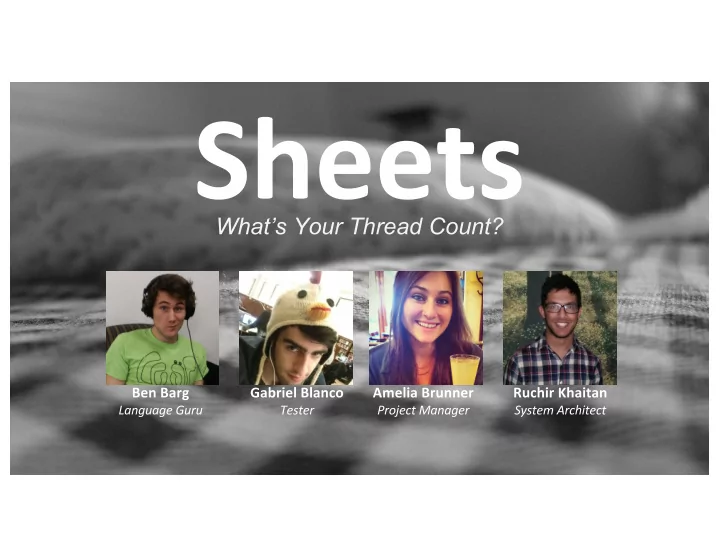

What’s Your Thread Count?
int funcs #~ block ~# + - * / int[] gfuncs ## inline > < >= <= float Block == != = . float[] ● ●
gfunc float[] gmultiply(float[] x, float[] y).[1]: for(int i= Block.start ; i< Block .end; i=i+1;): Block .out[i] = x[i] * y[i] func float[] snuggle(): float[] x = [1.,2.,3.,4.,5.,6.] float[] y = [.5,.5,.5,.5,.5,.5] float[] result[6] return result = gmultiply(x,y)
#include"cl_util.h" OpenCL int main(int argc, char** argv) { cl_device_id device_id; cl_context context; cl_kernel kernel; cl_mem cl_src; __kernel void image_filter(__global uchar4* src, cl_mem cl_dst; cl_command_queue queue; __global uchar4* dst, cl_context_properties *properties = NULL; int row_width) cl_event event; { int w; int x = get_global_id(0); int h; int y = get_global_id(1); int err = CL_SUCCESS; //My location in the image cl_uint num_platforms; cl_platform_id clPlatformID; int position = x + y * row_width; err = clGetPlatformIDs (1, &clPlatformID, NULL); CHK_ERROR(err, "clGetPlatformIDs"); //Read Input pixel device_id = getDeviceId(&clPlatformID); uchar4 in = src[position]; //Create Context context = clCreateContext(properties, 1, &device_id, NULL, NULL, &err); //Convert to greyscale CHK_ERROR(err, "clCreateContext"); uchar out = in.x * 0.299f + in.y * 0.587f + //Create Command Queue in.z * 0.114f; queue = clCreateCommandQueue(context, device_id, CL_QUEUE_PROFILING_ENABLE, &err); CHK_ERROR(err, "clCreateCommandQueue"); /*For Negative of the image*/ //Query Capabilities - TBD int* src = readBmp("sample.bmp", &w, &h); //uchar4 maxpixel = (uchar4)(255,255,255,0); int size = w*h*sizeof(int); //uchar4 out = maxpixel - in; int* dst = (int*)malloc(size); cl_src = clCreateBuffer(context, CL_MEM_USE_HOST_PTR, size, src, &err); CHK_ERROR(err, "clCreateBuffer source buffer"); //Write out result to same location in cl_dst = clCreateBuffer(context, CL_MEM_USE_HOST_PTR, size, dst, &err); destination image CHK_ERROR(err, "clCreateBuffer destination buffer"); dst[position] = (uchar4)(out, out, out, 0); kernel = getKernel(context, device_id); //set kernel arguments //dst[position] = out; err = clSetKernelArg( kernel, } 0, sizeof(cl_mem), &cl_src); err |= clSetKernelArg( kernel, 1, sizeof(cl_mem), &cl_dst); err |= clSetKernelArg( kernel, 2, sizeof(int), &w); CHK_ERROR(err, "clSetKernelArg"); const size_t global_work_size[2] = {w, h}; //Enqueue the kernel for execution err = clEnqueueNDRangeKernel( queue, kernel, 2, NULL, global_work_size, NULL, 0, NULL, &event); CHK_ERROR(err, "clEnqueueNDRangeKernel"); //Map the destination buffer back to a pointer usable on the host side //Its a blocking map (CL_TRUE for 3rd parameter) in order to force all enqueues in this queue to execute on the device void* host_data = clEnqueueMapBuffer(queue, cl_dst, CL_TRUE, CL_MAP_READ, 0, size, 0, NULL, NULL, &err); CHK_ERROR(err, "clEnqueueMapBuffer"); queryTimingInfo(event); //Write output to bmp file writeBmp("out.bmp", (int*)host_data, w, h); }
Recommend
More recommend